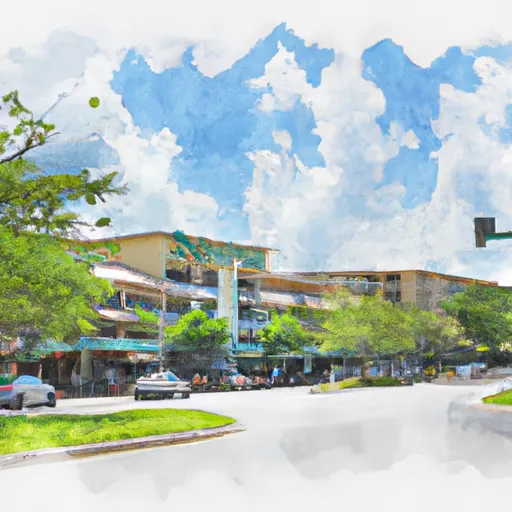-
 Snoflo Premium
Snoflo Premium
Get unlimited access to all our content
With no Ad interruptions! - Start Your Free Trial Login with existing account
Miami-Springs
Eden Index
Climate
5.1
•
Recreation
4.5
•
Community
2.4
•
Safeguard
4.2/10

Miami Springs is a charming city located within Miami-Dade County, Florida. The city has a tropical monsoon climate, characterized by hot and humid summers with frequent afternoon thunderstorms, and warm and dry winters. Summers are typically the wettest months, while winters are milder and drier, making it an ideal destination for outdoor activities year-round.
Hydrology constituents in Miami Springs are mainly influenced by its proximity to the coast. The city is situated on a limestone ridge, resulting in a high water table and abundant surface water. Biscayne Aquifer, a vital source of drinking water for South Florida, lies beneath the city's surface. Several canals and water bodies, such as the Miami Canal and Little River, traverse the region, providing opportunities for fishing, boating, and wildlife observation.
Outdoor recreation opportunities in Miami Springs are plentiful. The city offers numerous parks and green spaces, including the peaceful Miami Springs Golf & Country Club, which boasts an 18-hole golf course. There are also several local parks equipped with walking trails, picnic areas, and playgrounds for family outings. Miami Springs is conveniently located near the Everglades National Park, allowing residents and visitors to explore the unique ecosystem, hike through scenic trails, and spot diverse wildlife. Whether it's enjoying a round of golf or immersing in nature, Miami Springs offers an array of outdoor activities for all to enjoy.
What is the Eden Index?
The Snoflo Eden Index serves as a comprehensive rating system for regions, evaluating their desirability through a holistic assessment of climate health, outdoor recreation opportunities, and natural disaster risk, acknowledging the profound impact of these factors on livability and well-being.
Climate Health Indicator (CHI): 5.1
Miami-Springs receives approximately
1647mm of rain per year,
with humidity levels near 82%
and air temperatures averaging around
25°C.
Miami-Springs has a plant hardyness factor of
10, meaning
plants and agriculture in this region tend to thrive here all year round.
By considering the ideal temperature range, reliable water supplies, clean air, and stable seasonal rain or snowpacks, the Climate Health Indicator (CHI) underscores the significance of a healthy climate as the foundation for quality living.
A healthy climate is paramount for ensuring a high quality of life and livability in a region, fostering both physical well-being and environmental harmony. This can be characterized by ideal temperatures, reliable access to water supplies, clean air, and consistent seasonal rain or snowpacks.
Weather Forecast
Streamflow Conditions
Southern Florida
Area Rivers
Southern Florida
Snowpack Depths
Southern Florida
Reservoir Storage Capacity
Southern Florida
Groundwater Levels
Recreational Opportunity Index (ROI): 4.5
The Recreational Opportunity Index (ROI) recognizes the value of outdoor recreational options, such as parks, hiking trails, camping sites, and fishing spots, while acknowledging that climate plays a pivotal role in ensuring the comfort and consistency of these experiences.
Access to outdoor recreational opportunities, encompassing activities such as parks, hiking, camping, and fishing, is crucial for overall well-being, and the climate plays a pivotal role in enabling and enhancing these experiences, ensuring that individuals can engage in nature-based activities comfortably and consistently.
Camping Areas
| Campground | Campsites | Reservations | Toilets | Showers | Elevation |
|---|---|---|---|---|---|
| Easterlin Park | None | 3 ft | |||
| Phipps County Park | None | 14 ft | |||
| Quiet Waters Park | None | 14 ft | |||
| St. Lucie Lock | None | 20 ft | |||
| Topeekeegee Yugnee County Park | 60 | 5 ft | |||
| CB Smith Park | None | 6 ft | |||
| Larry and Penny Thompson Park | None | -1 ft | |||
| Jonathan Dickinson State Park | None | 25 ft | |||
| Markham Park | 86 | 10 ft | |||
| John Pennekamp - Coral Reef State Park | None | 11 ft |
Catastrophe Safeguard Index (CSI):
The Catastrophe Safeguard Index (CSI) recognizes that natural disaster risk, encompassing floods, fires, hurricanes, and tornadoes, can drastically affect safety and the overall appeal of an area.
The level of natural disaster risk in a region significantly affects safety and the overall livability, with climate change amplifying these risks by potentially increasing the frequency and intensity of events like floods, fires, hurricanes, and tornadoes, thereby posing substantial challenges to community resilience and well-being.
Community Resilience Indicator (CRI): 2.4
The Community Resilience Indicator (CRI) recognizes that education, healthcare, and socioeconomics are crucial to the well-being of a region. The CRI acknowledges the profound impact of these elements on residents' overall quality of life. By evaluating educational resources, healthcare accessibility, and economic inclusivity, the index captures the essential aspects that contribute to a thriving community, fostering resident satisfaction, equity, and social cohesion.

